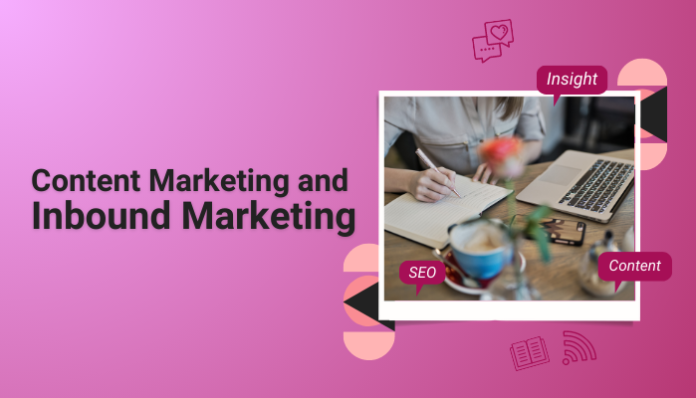Welcome to the thrilling world of content marketing and inbound marketing!
Imagine you are in a magical land where words hold immense power and propel brands to success. In this blog, you can understand the uncovered secrets of marketing strategies.
Content marketing is the art of capturing the heart and mind with compelling content. It is about creating valuable and relatable stories. It builds trust and keeps people coming back for more. By crafting compelling content, businesses can win over audiences. They can boost brand visibility and forge lasting connections that drive success.
While inbound marketing strategy is a mastermind strategy behind attracting customers. It is like a magnetic force that pulls people toward the brand. It includes SEO, social media, and personalized experience. An inbound marketing strategy ensures your brand is discovered by being at the right time.
In this article, you can learn about the difference between content and inbound marketing, the agencies, types, and examples of inbound marketing. Let us learn more about content and inbound marketing in the article. Dive in and get to know how they can help grow a business.
Is there any Difference Between Content and Inbound Marketing?
Content marketing and inbound marketing are the two eyes of marketing. They help in producing efficiency and success. These are not one-time investments, as they are a continuous process. With constant support and production of content, it is possible to grow customer engagement.
Here are a few major differences that you need to know about content and inbound marketing:
| Basis | Content Marketing | Inbound Marketing |
| Focus | Content marketing is primarily focused on creating valuable content. It attracts and retains a target audience. | Inbound marketing is a holistic approach to attracting and engaging potential clients. It is elaborated to form marketing strategies, including content marketing. |
| Strategy | It involves the creation of high-quality content through various channels. It includes blog posts, articles, podcasts, and more. | It involves a combination of tactics like content creation, email marketing, and more. It leads to nurturing potential clients and enhances customer relationship management (CRM). |
| Approach | It aims to provide valuable information about the audience’s pain points and interests. Addressing them builds customer trust and establishes the brand as an industry expert. | Inbound marketing targets a specific audience. It focuses on attracting customers searching for solutions related to the brand’s offerings. |
| Objective | It aims to educate and solve problems through valuable content. | Aims to attract and convert potential customers throughout their journey. It utilizes personalized experiences and relationship-building. |
| Channels | Content marketing uses various content formats like blog posts, social media, podcasts, e-books, etc. | Inbound marketing uses multiple channels: content marketing, SEO, email marketing, and more. |
What are the Types of Inbound Marketing?
Inbound marketing refers to a strategy that focuses on engaging with potential customers. It provides valuable and relevant content to attract them. It pulls people towards a business or grand rather than pushing advertising messages onto them. Here, you can find some of the common types in the inbounding market:
-
Content marketing
This involves creating and sharing valuable content. It includes blog posts, articles, podcasts, and an engaging target audience. Content marketing and inbound marketing go hand in hand. They help in creating a successful brand experience.
-
SEO
Search engine optimization helps in enhancing inbound marketing goals. It optimizes the website through keyword research and more. The content will help to improve visibility. The content enhances ranking on search engine results. It helps to attract organic traffic to your website by using relevant keywords.
-
Social media marketing
Social media marketing involves inbound marketing leveraging social media platforms. Instagram, Facebook, Twitter, and more help to engage with your target audience. It builds relationships. As more than half of the population uses social media, it encourages brand enhancement.
What are Different Inbound Marketing Examples?
Inbound marketing includes different strategies. It helps to optimize the content. Unlike traditional marketing methods, inbound marketing seeks to pull people toward a brand. It provides them with the information. Content marketing and inbound marketing don’t have much difference regarding examples. It generates leads and builds lasting customer relationships. Here are some examples of inbound marketing:
-
Influencer marketing
Influencer marketing includes brands collaborating with influencers to make sponsored content. It helps to increase brand credibility and visibility. The brands can host giveaways by partnering with influencers. This helps in more engagement with the customers. Influencers promote our products on their pages. It leads to gathering an audience and advertising more.
-
Webinars
Hosting webinars on industry-related topics can help in educating your audience. Organize workshops and training sessions to engage with your audience. It helps them with valuable insights. Hosting online virtual events like panels helps expand the network worldwide.
-
Search engine marketing
Search engine marketing is a way of marketing that includes optimizing search engines. Creating targeted pay-per-click ad campaigns on search engines enhances visibility. Tracking and optimizing ad campaigns helps to alter future plans. It is calculated based on the performance of the campaign. It helps take necessary actions.
How do Content Marketing Agencies help?
A content marketing agency is a helping hand for business. It provides support by creating and managing content marketing efforts. These agencies are digital experts who have a team of experts. They have professional knowledge in different fields. Content marketing and inbound marketing seek help from these agencies. Let us know how they can help businesses:
-
Content strategy development
Content marketing agencies can assist in developing a comprehensive content strategy. It aligns with business goals and target audience. They conduct research and create a roadmap for content creation.
-
Content creation
After thorough research, finding trendy and informative content will help create content. Usually, the agencies have an expert team. They are well-versed content creators like writers, designers, and more. They help in producing high-quality content. It resonates with the audience.
-
Content distribution and promotion
Agencies help in content distribution and promotion. They ensure that the content reaches the right audience. They seek help from strong channels. It includes social media, influencer partnerships, and SEO. These platforms help in optimizing content visibility.
-
Performance measurement and analysis
Content marketing agencies analyze the performance of the campaigns. They use analytical tools to measure the best way to drive traffic. It includes website traffic, conversion rates, and ROI. This data helps in refining content strategies and making data-driven decisions.
Conclusion
In the realm of marketing, content marketing and inbound marketing captivate an audience. On the one hand, content marketing is a creative catalyst. Conversely, inbound marketing is the expert in attracting and converting customers.
Together, Inbound and content marketing form an unbeatable alliance. It leverages its powers to establish trust and long-lasting customer relationships. Every business must include these strategies to enhance their business.















